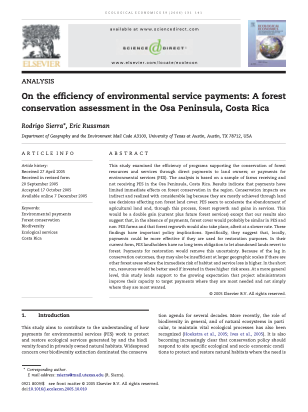Resource information
This study examined the efficiency of programs supporting the conservation of forest resources and services through direct payments to land owners; or payments for environmental services (PES). The analysis is based on a sample of farms receiving and not receiving PES in the Osa Peninsula, Costa Rica. Results indicate that payments have limited immediate effects on forest conservation in the region. Conservation impacts are indirect and realized with considerable lag because they are mostly achieved through land use decisions affecting non forest land cover. PES seem to accelerate the abandonment of agricultural land and, through this process, forest regrowth and gains in services. This would be a double gain (current plus future forest services) except that our results also suggest that, in the absence of payments, forest cover would probably be similar in PES and non PES farms and that forest regrowth would also take place, albeit at a slower rate. These findings have important policy implications. Specifically, they suggest that, locally, payments could be more effective if they are used for restoration purposes. In their current form, PES landholders have no long term obligation to let abandoned lands revert to forest. Payments for restoration would remove this uncertainty. Because of the lag in conservation outcomes, they may also be insufficient at larger geographic scales if there are other forest areas where the immediate risk of habitat and service loss is higher. In the short run, resources would be better used if invested in these higher risk areas. At a more general level, this study lends support to the growing expectation that project administrators improve their capacity to target payments where they are most needed and not simply where they are most wanted.


